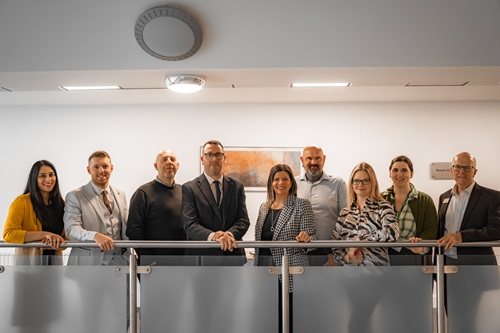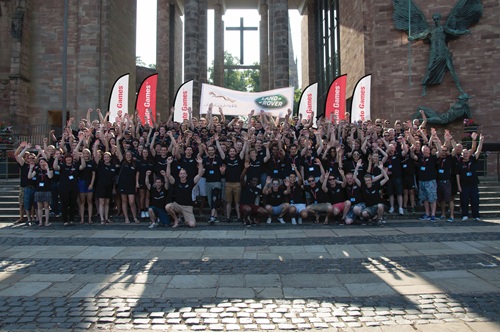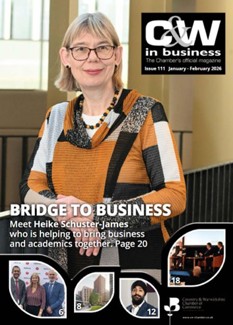The skills shortage was exacerbated by the pandemic which skewed the labour market and now economic uncertainty, increasing costs of doing business and the looming Employment Rights Bill have made it a much more complicated picture.
Throw in the rise of AI and firms could be forgiven for not knowing which way to turn when it comes to their most important resource – their people.
The Chamber, alongside WCG and the Chartered Institute of Personnel and Development (CIPD), organised a Local Labour Market Symposium to take a deeper dive into the whole issue.
Navneet Rai, Business Development Manager, and Innovation Practitioner at WCG, said: “We have been organising the Local Labour Market Symposium alongside partners for the last three years as we feel that it is a valuable event that addresses business and employee needs.
“Our events have a focus on well-being, recruitment, retention, and developing workforces that thrive. This year we also heard from innovation speakers, and a neurodiversity speaker, as we believe that inclusive cultures are at the forefront of well-being.”
Coventry and Warwickshire, as Corin Crane, Chief Executive of the Chamber, put it, is microcosm of the UK economy with a wide range of sectors – from advanced manufacturing through to tourism – all contributing to the resilience of the region.
Esmeralda Bon, the CIPD’s Labour Market Analyst, offered insights into the make-up of the regional economy and the opportunities and threats it faces in the coming years, and how this may affect employment.
She revealed that the utility sector is currently the biggest in the region when it comes to gross value added (GVA), a measure of economic output and that close to 14,000 people work in the industry. This could rise by nine per cent to more than 15,000 by 2030.
Logistics and e-commerce employs 34,720 people, the most of any industry cluster. Employment growth is expected to be strong (plus seven per cent) in this industry rising to over 37,000 in the next five years.
Professional services could add another 1,800 people by 2030 – growing to nearly twenty-seven thousand in employment across Coventry and Warwickshire. While civil engineering is forecast to have the highest percentage change (plus 17 per cent), growing from 23,441 to around 27,500 in the next five years.
Automotive services currently employs 18,635 and is predicted to rise to over 20,000 over the period. However, vehicle and defence technology is an industry which is expected to decline nationally and employment in Coventry and Warwickshire is anticipated to fall slightly from 13,208 to just under 12,000 by 2030.
“The region benefits from a strong base of a variety of industries,” said Esmeralda. “Green jobs also present a real opportunity for growth and it is something the area must be ready to take advantage of.”
With a promise of growth, Corin said it was important that firms didn’t bury their heads in the sand when it comes to the Employment Rights Bill, describing it as the biggest piece of legislation to affect businesses in decades.
“You must have this on your radar,” he said. “We have it on ours and we are going to be lobbying Government on it so that we can get the right support and information out to companies of all sizes and sectors.”
And, despite the mixed economic picture, the forecast for employment growth means businesses must expand their horizons when it comes to finding staff.
Cat Brown, Director of Warwickshire-based recruitment giant Pertemps, said AI would have a part to play but that the human touch is still crucial.
“The most important part of any business is people,” Cat said. “So, while we are introducing AI and tech-led processes to increase efficiency and productivity, we can’t and shouldn’t eliminate people-led processes altogether. Building relationships is more important than ever.
“AI can help us implement blind recruitment processes and shortlist large talent pools quickly, but we have to monitor outputs continuously to ensure biases aren’t introduced.
“As businesses embrace the use of AI, so do candidates, and the face-to-face interview still forms a critical evaluation stage to make sure the candidate’s skills aren’t just on paper, created by AI matching their background to your job spec.
“A really interesting example came from a business I was speaking to recently.
“They’d had 20 applications for a job and 18 were virtually the same because individuals had clearly used AI to answer the questions. Guess what? They took on the two people who had filled out the applications themselves.”
Charlie Hart, a speaker and advocate on neurodiversity and inclusion, gave a personal account on autism and ADHD and the impact it has had on her career.
Charlie, who has had a 20-year career in technical HR roles and is an associate CIPD member, said it gave her considerable strengths in certain aspects of her work and employers who gained better understanding of neurodiversity could tap into a larger pool of talent.
“If employers can be patient with the stuff I find hard,” said Charlie, “then they’ll get someone who can deliver great results in other aspects of my work.”
As well as recruitment, there is also the small matter of staff retention, with businesses fighting tooth-and-nail to keep the best people and enhance productivity.
David Wilson, of Teams Glued, revealed a new VR product that could be available by the end of the year that will get people with different characteristics working together to solve a problem and, therefore, be more understanding of each other’s strengths in the real world.
It has been supported by Innovate UK through the UK Launchpad: immersive & creative, Coventry & Warwickshire programme.
Innovate UK is also behind the Further Education Innovation Fund (FEIF), which is another way for colleges to strengthen their ties with business.
WCG, Coventry College, Stratford-upon-Avon College and NWSLC are all part of the project in this region and Matt Alvarez, the consortium project manager for WCG, said it was focusing on practical support to drive sustainable growth.
The symposium was held at Warwick Trident College, one of five across the region within the WCG group that delivers training and apprenticeships to thousands each year.
Stuart Evans, Deputy Principal at WCG, said partnership with business is vital.
“We have a very broad curriculum and we react at pace when the local labour market needs it,” he said.
“Whether it is administration or digital skills, or if its construction or engineering, we’re committed to working with businesses. “
“In fact, we’ll say bring the problem to us and we’ll help you find a solution. Let us co-design something with you because we want to be delivering training and courses that meet the needs of our regional economy.”
The Local Skills Improvement Plan (LSIP), which is overseen by the Coventry and Warwickshire Chamber of Chamber of Commerce in the West Midlands and Warwickshire, is also making strong progress in placing the future of skills in the hands of employers.
“For too long, ministers decided what courses and training should look like,” said Corin Crane, Chief Executive of the Coventry and Warwickshire Chamber of Commerce. “That directive and funding would be passed down and eventually reach colleges and training providers and it was a case of ‘go and sell that to businesses in your area’.
“LSIPs have flipped that on its head. We’re listening to businesses on exactly what they need and then presenting that plan to colleges across the region who are responding to it and can access funding to deliver it.
“It means we are talking to and surveying employers across the region all the time and it’s vitally important that they engage with us on it. We’ve heard their concerns over many years and this is a real opportunity to bring about change and co-create courses and ways of learning.”


























